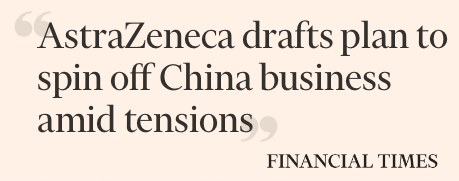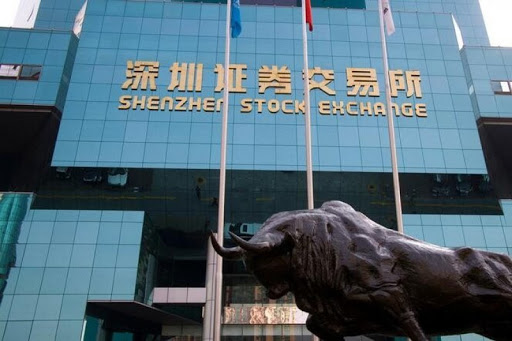
This is why AstraZeneca is considering a spin off of its activities in China
The growing geopolitical tensions between China and the United States (and its allies) are forcing those who do business with the Dragon to review their corporate strategy. AstraZeneca, for example, has drawn up a plan for  spin off its China operations and list them separately in Hong Kong or Shanghai. L'Financial Times article
spin off its China operations and list them separately in Hong Kong or Shanghai. L'Financial Times article
AstraZeneca has drawn up a plan to spin off its China operations and list them separately in Hong Kong, in order to shield the company from rising geopolitical tensions.
The Anglo-Swedish pharmaceutical firm began discussing the idea with bankers several months ago and is among a growing number of multinationals considering the option, according to three people familiar with the talks.
The same people have warned that ultimately the separation may not happen. One of the people said that the listing of the entity in Shanghai is also possible.
The discussion shows the significant restructuring that multinational corporations could be forced to undertake as they adjust to growing friction between China and the United States and its allies.
 According to plans, AstraZeneca, the UK's largest publicly traded company by market value (£183bn), would spin off its China operations into a separate legal entity, while retaining control of the company.
According to plans, AstraZeneca, the UK's largest publicly traded company by market value (£183bn), would spin off its China operations into a separate legal entity, while retaining control of the company.
The idea has been "on the table for a few years," said an AstraZeneca consultant, adding that until recently it had been shelved due to the global decline in biotech stocks.
“Every multinational with a strong business in China” appears to have been considering a similar move, said a senior banker based in Asia. "Even if it's just an option to have flexibility in the future, it's worth thinking about."
A person briefed on AstraZeneca's plans said listing a separate unit in Hong Kong or Shanghai could politically insulate the company from any moves by China to crack down on foreign companies, more plausibly making it a national Chinese firm. It would also offer a separate source of capital.
The separate listing could also help investors in the remaining company reassure themselves that they have less exposure to China-related risk.
A consultant to pharmaceutical companies added that pursuing a national listing could help AstraZeneca woo Beijing's support for drug innovation and gain faster approvals for Chinese-developed therapies.
It wouldn't be the first time the pharmaceutical group has sought separate funding for its operations in China. In 2017, AstraZeneca set up an R&D joint venture with a Chinese fund. The joint venture, Dizal Pharmaceutical, was listed in Shanghai two years ago.
AstraZeneca said it was "not commenting on any rumors or speculation about future strategies or M&As".
China is an attractive market for pharmaceutical companies due to its large and aging population, which is increasingly suffering from diseases caused by smoking, pollution and Westernized diets. The Chinese government has accelerated approval processes for innovative treatments, seeking to encourage drug companies to expand beyond offering their older or generic treatments in the country.
AstraZeneca has also said it is interested in closing deals with Chinese biotechs. After returning from a tour of the country, Chief Executive Pascal Soriot said in April that the firm had "no limit" on buying Chinese companies. Last month it signed a partnership worth up to $600 million with Shanghai-based LaNova Medicines to globally license a possible cancer drug.
Michel Demaré, president of the company, told al Financial Times last month: "When you are a global company like AstraZeneca you always have to deal with geopolitical risk and you must try to manage it without getting too involved".
(Extract from the foreign press review edited by and for communication)





